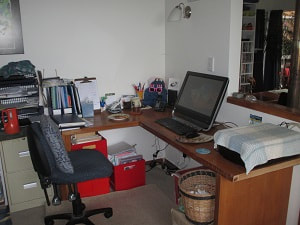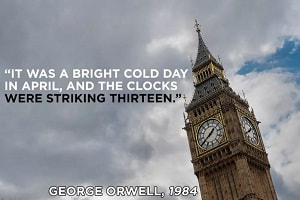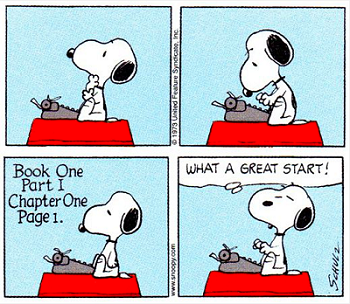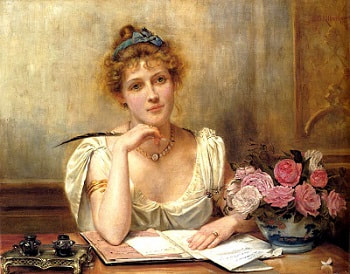 “A woman must have money and a room of her own if she is to write fiction.” So said author Virginia Woolf in her book A Room of One's Own. These days, most of us will probably have a room ... but the money can be a problem for any writer, let alone just women fiction writers. Where do you write? Jane Austen wrote at a spindly little table whose top was the size of a dinner plate. Virginia wrote at a simple desk in a converted tool shed in the garden that was so cold in winter she could barely hold her pen, and JK Rowling scribbled out the ideas for Harry Potter while delayed on a train. The places where we write are as individual as we are. Above is a photo of my writing space with a desk we made out of an old door, tacked into a corner of my living room. I face the wall when working so as not to be tempted by the view of the Hauraki Gulf which is to my right. Betsy the cat likes to sit up on the top of my printer and watch me while I tap away. It suits me. Under the desk are files in red plastic storage things and behind me is a set of shelves with all manner of books. I like this space because it gets plenty of natural light and I can spread out. The only thing I don't like so much is it's in the middle of my living room. It would be better, I think, if I worked in a room I could walk out of and close the door on at the end of the day. But that's a minor problem indeed. Finding a comfortable working space is important for your writing. Not only is it a practical necessity (i.e. you really do need a table and a chair, bare minimum) but it's a place you can call your own, for your writing life. Feeling secure in your writing environment will in turn lead to good productivity, which will then turn into money. Of course it will. Having a room of one's own is a good place to start.
0 Comments
 Ever since Herman Melville began his novel Moby Dick with the words, "Call me Ishmael" authors have wrestled with that all-important first line. Who can forget Charles Dickens beginning A Tale of Two Cities with, "It was the best of times, it was the worst of times ..." or Orwell's quote from 1984. Ah yes, that first line - how we agonise over it - and I wonder if Charles, Herman and George worried over theirs or if they just thought, "You know what? I'm going to start my book like this." I enjoy browsing in bookstores and in Auckland we're blessed with some great ones like The Women's Bookshop in Ponsonby, Time Out in Mt Eden and the fabulous Unity Books in High St. I'm a magpie when it comes to book covers - I'm attracted to flashy ones. That's the first thing that catches my eye. The title is right up there too - it's a contest over which gets me first. I'll pick up the book and the next thing I do is turn to the first page and read the first few sentences. If they don't grab me, down it goes and I'm foraging again. The other day in the library I picked up a book called Shelter In Place by Alexander Maksik. True to form, it was the cover that attracted me - a picture of misty pine trees in colours of grey and white. It reminded me of the Pacific Northwest where I was born and indeed lived for a number of years and sure enough, the blurb inside the cover said it was set there. Then I went to the opening line and here's what it was: "In the summer of 1991 my mother beat a man to death with a twenty-two ounce Estwing hammer and I fell in love with Tess Wolff." Gotcha. Right away I wanted to know why his Mom killed some guy with a hammer and who is Tess Wolff. First lines are even more important in shorter items, like magazine articles and essays. Each sentence must induce the reader to keep going: first sentence leads to second, second to third and so on. There's a bit more leeway in a novel but still that opening will hook the reader in ... or not. And you must keep the promise to the reader that you make in the opening line. Mr. Maksik's book does, but it is a bit of a ramble and somewhat repetitive so I can't say hand on heart that he delivers to my satisfaction as a reader but he does deliver. There's nothing worse than reading through a book, feeling progressively disappointed and let down, and if you do make it to the end, thinking, "What a swizz! The writer never really told me who murdered who, or why." So writing a good beginning can take skill, and time, crafting the all important hook that will interest your reader right from the start. We're all different in how we approach that first line; sometimes we'll write it after we've finished the book, maybe it comes first as the inspiration for the entire work. However it comes, make it good, irresistible, kick-ass. Entice your reader to keep going, entertain him/her with the freshness of your words and the originality of your ideas, surprise us, engage us, make us think, and lead us by the nose into your book.  So said 19th century American novelist and short story writer Nathaniel Hawthorne. Truer words have never been spoken. When you read writing that flows, words that engage you and you're in love with, I would say, hand on heart, that hours of meticulous and hard work went into creating it. Because great writing doesn't happen by accident. I first started writing stories when I was at high school, long, rambling tomes. I called them my 'Downfall Series'. There was The Downfall of Ferguson the Fiendish, The Downfall of Dawn the Dastardly, and The Downfall of Huntley the Heretic. The stories were populated with my school mates, teachers we didn't like (they were the villains), the fanciest cars imaginable (we all, magically, had our drivers' licences and roared about in Triumph Spitfires) and the most elegant and captivating locations my 13-year-old mind could imagine, like the Auckland War Memorial Museum, the Container Terminal and the fancy wine bar on K Road. I progressed to writing short stories and plays and by the time I was 16, I was getting serious about things. My best friend's Mum was a writer. She had written for newspapers too, had a journalist's eye for stories, and editing the writing down to extract those magic words that flow so effortlessly on the page was her forte. She took me under her wing. Most Saturday afternoons I would sit at the dining table with her, show her my work, and she would set to with a red pen, slashing and burning just about every word. I was devastated because I thought my creation was perfect in every way. How dare she presume to tell me otherwise? But I didn't protest. I took it on the chin but wow, I suffered inside, and my creative ego took a bruising. Over time, I learned, saw what she was doing, what she was getting at, and the slashings became fewer. My mentoring with her went on for several years and into my adulthood. I would send her pieces of writing from wherever I was living (we did things by post back then!), she would do an edit and send it back. So I learned early on that good writing is hard work. Sure, when we're getting something down, in the full flush of creativity, we can't be too concerned with editing and how things sound or look. It's about capturing it on the page so we have that raw material to craft into those fine, fabulous words. And that's where the hard work, the real writing, begins. I am grateful for the many Saturday afternoons that my friend's Mum spent with me, giving of her time and expertise to help me with my Downfalls, plays and other projects. At that young age, I thought I knew everything, and no one was gonna tell me different. Fortunately the wisdom of years has taught me otherwise.  When it comes to writing about yourself, you may wonder, why am I bothering? Who is going to be interested in my life and what I have to say? You may be surprised. Telling stories about ourselves is almost as old as time itself. We've been doing it since we dwelt in caves. Back then, we drew pictures of our surroundings and activities - drawings of the animals we saw every day, the ones we killed for food, sketchings of our environment including aliens from space (or so some believe - and they could be right! Now there's a story). As time went on, we perfected the art of verbal storytelling, and of course began writing stories, making history. We write because we have something to say that holds meaning for us. We want to share this with others. The telling helps us make sense of our world, who we are, and our place in the big scheme of things. Being human, we embellish, invent, we make up stuff. We can't help it. We create story. For example, say I took a walk on the beach. I could tell you that, and you might go, 'OK, so what?' But if I add a few little 'embellishments', I can engage your interest. If on my walk I actually saw a little fish leap out of the shallows, I could tell you that I saw a much larger creature, possibly a big shark, I couldn't be 100% sure, thrashing about, perhaps chasing a stingray, and you would probably be more interested in what I have to say. I'm not exactly lying because I did see a fish, and I'm a bit vague about the identity of my larger fish - it may have been a shark and it might have been chasing a stingray - but hey, it's more interesting, and of course fishermen/women often enhance their stories about the catch of the day ... But hey, I'm not suggesting you totally fictionalize life story writing, make up stuff about your life, nor invent people that never existed, or attribute actions to real people that they never actually did, or tell me about situations that you never found yourself in, ever (and some published 'memoirs' in recent years have indeed been largely fabrications, take James Frey's A Million Little Pieces ). I think there is some leeway to be creative, and there's a genre for this called 'creative non-fiction' that allows us to use a basis of truth in our story telling, but have the freedom to create around that. Being creative, adding colour, clarity, vibrancy, and interest to our life writing can engage our readers. They will be interested in what we have to say, and what we tell them might just resonate profoundly in a life-changing way. I explore much of this in my Life Writing Workshops - join me and other 'life writers'? Please do. |
Archives
January 2024
|